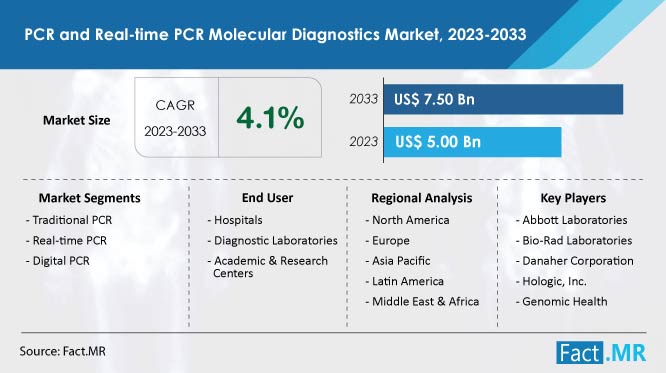Molecular diagnostics has emerged as a pivotal player in modern healthcare, revolutionizing disease detection, monitoring, and research. Polymerase Chain Reaction (PCR) and its refined counterpart, Real-time PCR, have significantly transformed the diagnostics industry. These powerful techniques offer unparalleled sensitivity, accuracy, and speed, enabling scientists and healthcare professionals to detect and quantify genetic material with remarkable precision.
Download Sample Copy of This Report:
https://www.factmr.com/connectus/sample?flag=S&rep_id=5247?AS
Understanding PCR and Real-time PCR
Polymerase Chain Reaction (PCR): PCR is a widely-used molecular biology technique developed in the 1980s by Kary B. Mullis. It allows the amplification of a specific segment of DNA through a series of temperature-controlled reactions. The process involves denaturation, annealing, and extension, resulting in the exponential replication of the target DNA region.
Real-time PCR: Also known as quantitative PCR (qPCR), real-time PCR builds upon the basic PCR principle by allowing continuous monitoring of the amplification process. It employs fluorescent dyes or probes that emit signals when they bind to the target DNA, enabling the quantification of the amplified DNA in real-time. This real-time monitoring eliminates the need for post-amplification analysis, making the technique faster and more precise.
Applications in Molecular Diagnostics
- Infectious Disease Diagnosis: PCR and real-time PCR have revolutionized the diagnosis of infectious diseases by detecting specific pathogen DNA or RNA. This has greatly improved the accuracy and speed of diagnosing viral, bacterial, and fungal infections. For instance, during the COVID-19 pandemic, real-time PCR played a pivotal role in diagnosing SARS-CoV-2 infections.
- Cancer Detection and Monitoring: These techniques have enabled the identification of genetic mutations associated with various cancers. Real-time PCR is particularly valuable in monitoring minimal residual disease, allowing clinicians to gauge treatment efficacy and recurrence risk in cancer patients.
- Genetic Testing: PCR-based diagnostics are extensively used in genetic testing, including prenatal screening, carrier testing, and diagnosing genetic disorders. Real-time PCR’s ability to quantify gene expression levels has furthered our understanding of genetic variations and their implications.
- Forensic Identification: PCR has revolutionized forensic science by enabling the analysis of small DNA samples from crime scenes. DNA fingerprinting, a technique that uses PCR to amplify specific DNA regions, has become a cornerstone in criminal investigations.
- Food Safety and Environmental Monitoring: PCR-based assays are employed to detect foodborne pathogens and monitor environmental contaminants. Real-time PCR’s accuracy and speed make it an ideal tool for ensuring the safety of food and water supplies.

Impact on the Industry
- Accuracy and Sensitivity: PCR and real-time PCR offer unparalleled accuracy and sensitivity, enabling the detection of even minute amounts of genetic material. This is crucial for early disease detection and monitoring.
- Speed: Real-time PCR’s ability to provide results in real-time significantly reduces the turnaround time for diagnostics, allowing for quicker patient management and informed decision-making.
- Automation: Automated platforms have streamlined the PCR and real-time PCR processes, reducing the chances of human error and increasing throughput in clinical laboratories.
- Research Advancements: These techniques have revolutionized research in genetics, genomics, and molecular biology. They enable researchers to study gene expression, mutations, and variations with precision, leading to insights into disease mechanisms and potential therapeutic targets.
Conclusion
The Polymerase Chain Reaction (PCR) and Real-time PCR have transformed the landscape of molecular diagnostics. Their applications span across infectious disease diagnosis, cancer monitoring, genetic testing, forensics, food safety, and environmental monitoring. The industry owes a debt of gratitude to these techniques for their accuracy, sensitivity, speed, and impact on medical research and patient care. As technology continues to evolve, we can only anticipate further refinements and applications of these powerful tools in the realm of molecular diagnostics.